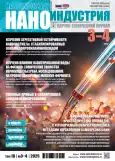Разработка биосовместимой мультиэлектродной ячейки для исследования живых сетей нейронов методом сканирующей капиллярной микроскопии
- Авторы: Иванов О.В.1,2, Ахметова А.И.1,2, Яминский И.В.1,2
-
Учреждения:
- МГУ имени М.В.Ломоносова
- ООО НПП "Центр перспективных технологий"
- Выпуск: Том 18, № 3-4 (2025)
- Страницы: 166-172
- Раздел: Нанотехнологии
- URL: https://journals.eco-vector.com/1993-8578/article/view/684011
- DOI: https://doi.org/10.22184/1993-8578.2025.18.3-4.166.172
- ID: 684011
Цитировать
Полный текст
Аннотация
Разработана и охарактеризована инновационная биосовместимая мультиэлектродная ячейка, интегрирующая технологии регистрации электрической активности нейронов с возможностями высокоразрешающей сканирующей капиллярной микроскопии. Предложенная конструкция включает подложку из ITO-покрытого стекла с лазерно-паттернированными электродами, изолированными слоем парилена и функционализированными медно-золотыми микроэлектродами с мемристорными свойствами. Прототип демонстрирует преимущества одновременной регистрации электрической активности и морфологических изменений нейронов, открывая новые возможности для исследования нейрональной пластичности, структурного распределения нервной ткани и скрининга нейроактивных соединений.
Полный текст
Об авторах
О. В. Иванов
МГУ имени М.В.Ломоносова; ООО НПП "Центр перспективных технологий"
Email: yaminsky@nanoscopy.ru
ORCID iD: 0000-0003-2765-2116
магистр
Россия, Москва; МоскваА. И. Ахметова
МГУ имени М.В.Ломоносова; ООО НПП "Центр перспективных технологий"
Email: yaminsky@nanoscopy.ru
ORCID iD: 0000-0002-5115-8030
к.ф.-м.н., ст. науч. сотр., вед. спец.
Россия, Москва; МоскваИ. В. Яминский
МГУ имени М.В.Ломоносова; ООО НПП "Центр перспективных технологий"
Автор, ответственный за переписку.
Email: yaminsky@nanoscopy.ru
ORCID iD: 0000-0001-8731-3947
д.ф.-м.н., проф., ген. дир.
Россия, Москва; МоскваСписок литературы
- Soscia D.A. et al. A flexible 3-dimensional microelectrode array for in vitro brain models. Lab on a Chip. 2020. Vol. 20. P. 901. https://doi.org/10.1039/C9LC01148J
- Park D.-W. et al. Graphene-based carbon-layered electrode array technology for neural imaging and optogenetic applications. Nature Communications. 2014. Vol. 5. PP. 1–11. https://doi.org/10.1038/ncomms6258
- Murali A. et al. Synthesis and Characterization of Indium Oxide Nanoparticles. Nano Letters 2001. Vol. 1 (6). PP. 287–289. https://doi.org/10.1021/nl010013q
- Sofi A.H., Shah M.A. The study of the structural and morphology features of indium tin oxide (ITO) nanostructures. 2014. Mater. Res. Express. Vol. 1. P. 015041. https://doi.org/10.1088/2053-1591/1/1/015041
- Song J.E. et al. Preparation and characterization of monodispersed indium–tin oxide nanoparticles. Colloids and Surfaces A: Physicochemical and Engineering Aspects. 2005. Vol. 257–258. PP. 539–542. https://doi.org/10.1016/j.colsurfa.2004.07.037
- Li Z. et al. Achieving Reliable and Ultrafast Memristors via Artificial Filaments in Silk Fibroin. Advanced Materials. John Wiley and Sons Inc. 2024. Vol. 36. P. 4. https://doi.org/10.1002/adma.202308843
- Minnekhanov A.A. et al. Parylene Based Memristive Devices with Multilevel Resistive Switching for Neuromorphic Applications. Sci Rep. 2019. Vol. 9. P. 10800. https://doi.org/10.1038/s41598-019-47263-9
- Minnekhanov A.A. et al. On the resistive switching mechanism of parylene-based memristive devices. Org Electron. Elsevier B. V. 2019. Vol. 74. PP. 89–95. https://doi.org/10.1016/j.orgel.2019.06.052
- Cai Y. et al. A flexible organic resistance memory device for wearable biomedical applications. Nanotechnology. Institute of Physics Publishing. 2016. Vol. 27. P. 27. https://doi.org/10.1088/0957-4484/27/27/275206
- Buccelli S. et al. A Neuromorphic Prosthesis to Restore Communication in Neuronal Networks. iScience. Elsevier Inc. 2019. Vol. 19. PP. 402–414. https://doi.org/10.1016/j.isci.2019.07.046
- Filippova S.Yu. et al. Cultivation of cells in alginate drops as a high-performance method of obtaining cell spheroids for bioprinting. South Russian Journal of Cancer. ANO -Perspective of Oncology, 2023. Vol. 4. No. 2. PP. 47–55. https://doi.org/10.37748/2686-9039-2023-4-2-5
Дополнительные файлы







